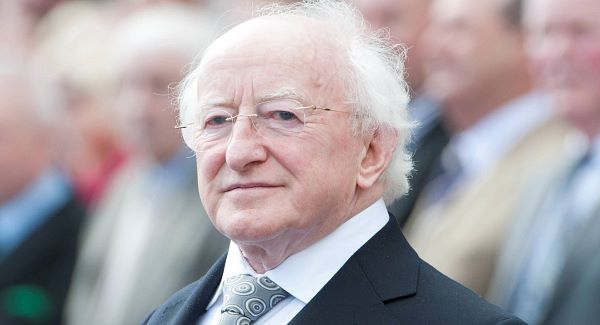
President Michael D Higgins has suggested Britain's "imperial triumphalism" be re-examined in the same way as Irish republicanism has been over recent years.
In a keynote speech at an event marking Ireland's Easter Rising against British rule a century ago, President Higgins said there has been much discussion of violence by Irish nationalists at the turn of the last century.
But he noted the "supremacist and militarist imperialism" of Britain over the same time had not been reviewed with "the same fault-finding edge".
"In the context of 1916, this imperial triumphalism can be traced, for example, in the language of the (British Army) recruitment campaigns of the time, which evoked mythology, masculinity and religion, and glorified the Irish blood as having 'reddened the earth of every continent'," he said.
"But this is for another day."
[raw]
[/raw]President Michael D. Higgins takes to the stage in the @MansionHouseDub, at the #ReflectingTheRising event: pic.twitter.com/2fhowxfd39
— President of Ireland (@PresidentIRL) March 28, 2016
President Higgins made the remarks at a talk entitled Remembering 1916 at Dublin's Mansion House today.
The President said there "has been a great deal of critical reassessment of aspects of the Rising and, in particular, of the myths of redemptive violence that were at the heart, not just of Irish nationalism, but also of imperial nationalism".
He added: "My view is that the latter has not, perhaps, been revisited with the same fault-finding edge as the former.
"Indeed, while the long shadow cast by what has been called 'the Troubles' in Northern Ireland has led to a scrutiny of the Irish Republican tradition of 'physical violence', a similar review of supremacist and militarist imperialism remains to be fully achieved."
President Higgins described the leaders of the 1916 rebellion - who were executed by Britain - as "advanced thinkers, selfless women and men, who took all the risks to ensure that the children of Ireland would, in the future, live in freedom and access their fair share of Ireland's prosperity".
But he added their vision was not realised in the founding years of the new Irish State.
President Higgins said Irish people have a duty to retrieve the idealism at the heart of the Easter Rising.
[raw]
— President of Ireland (@PresidentIRL) March 28, 2016[/raw]
"But we have a greater duty to imagine and to forge a future illuminated by the unfulfilled promises of our past," he said.
"All of us are invited, then, in this year of 2016, to reach for the ideals and hopes that animated so many of the men and women of 1916 in their struggle for freedom, equality and social justice.
"Informed by the manifest needs of our times, let us test again these ideals; let us retrieve the courage, the utopianism, of 1916 - and let us add to it, as we craft, together, a new and inspiring vision for the coming generations.
"Let us revive the best of the promise of 1916, so that those coming generations might experience freedom in the full sense of the term - freedom from poverty, freedom from violence and insecurity, and freedom from fear."
President Higgins made his remarks as wreaths were laid at seven locations around Dublin which were key to the revolt.
Rebels took up positions a century ago on Easter Monday at Boland's Mill, the Jacob's Factory on Bishop Street, City Hall, The Four Courts, The Royal College of Surgeons, Moore Street and the South Dublin Union on the site of the present-day St James' Hospital.
The makeshift garrisons were chosen for their strategic locations and proximity to British Army strongholds in the city.
Wreaths were also laid in Athenry, Cork, Enniscorthy and Ashbourne.
[raw][/raw]
During the day, more than 500 free talks, exhibitions, debates, films, performances and dramatisations were put on to explore the tumultuous events which played a pivotal role in shaping Ireland.
[raw]
[/raw]People are having mad craic at the ceili beside the National Concert Hall #ReflectingTheRising pic.twitter.com/tamfhc5lrZ
— Michelle Hennessy (@michellehtweet) March 28, 2016


